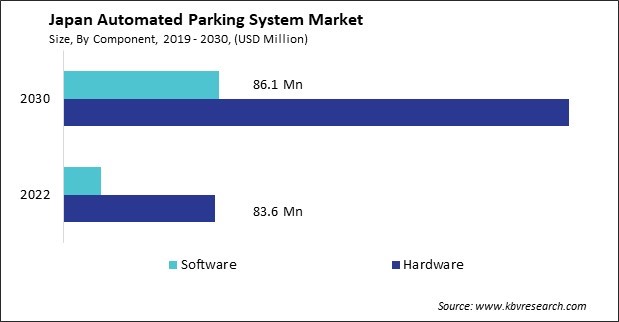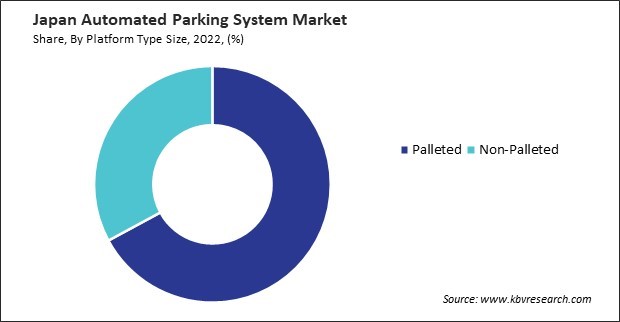The Japan Automated Parking System Market size is expected to reach $366.3 million by 2030, rising at a market growth of 17.2% CAGR during the forecast period.
The increased use of automated parking systems in Japan can be attributed to environmental considerations and government support, which have contributed to the growing adoption of these innovative parking solutions. Japan, known for its strong emphasis on environmental sustainability and technological innovation, has been at the forefront of promoting smart and eco-friendly urban development, where automated parking systems play a significant role.

Environmental considerations have played a crucial role in driving the adoption of automated parking systems in Japan. As a densely populated country with limited space, Japan faces significant challenges related to urbanization, including the need to optimize land use and reduce environmental impact. Additionally, the energy efficiency of automated parking systems, achieved through features such as efficient lighting and ventilation systems, aligns with Japan's commitment to sustainability.
Government support has also been instrumental in driving the adoption of automated parking systems in Japan. The Japanese government has implemented policies and initiatives aimed at promoting the use of smart city technologies, including automated parking systems, as part of broader efforts to create more efficient and sustainable urban environments. This support has included funding for research and development in automated parking technologies, as well as incentives for property developers and building owners to incorporate these systems into their projects. Government initiatives have also focused on streamlining regulations and standards related to automated parking systems to facilitate their widespread adoption.
Moreover, Japan's strong technological capabilities and innovation ecosystem have enabled the development of advanced automated parking solutions that meet the country's specific needs and requirements. Japanese companies have been at the forefront of developing cutting-edge technologies for automated parking systems, which has contributed to the reliability, efficiency, and safety of these systems.
Japan's increasing demand for automated parking systems is closely linked to the country's significant land constraints, especially in densely populated urban areas. In Japan, the land is full of undulation, with mountainous regions, including hilly terrain, accounting for about three-quarters of its total area. Japan's cities, such as Tokyo, Osaka, and Yokohama, face immense pressure to optimize land use due to limited available space for parking facilities. Traditional parking structures, including surface lots and multi-story garages, are often inefficient in their use of space, leading to a mismatch between parking supply and demand.
In Japan's urban environments, where every square meter of land is valuable, the space-saving benefits of automated parking systems are particularly attractive. By freeing up land that would have been used for parking, these systems contribute to more efficient and sustainable urban development. This is especially important in cities like Tokyo, where space is at a premium, and there is a constant need to balance competing demands for residential, commercial, and public spaces. Therefore, the demand for automated parking systems is expected to continue growing as Japanese cities seek sustainable and efficient solutions to their parking challenges, making Japan a key market for automated parking system providers.
In Japan, there has been a notable trend of a rising proportion of vehicle ownership over the years, driven by various factors that have contributed to the increased demand for automobiles among the Japanese population. One of the key factors contributing to this trend is the country's improving economic prosperity, which has led to higher disposable incomes among its citizens. As a result, more individuals and families have been able to afford the purchase and maintenance of private vehicles, leading to a steady increase in vehicle ownership rates.
Another factor contributing to Japan's rising proportion of vehicle ownership is the country's aging population. With a growing number of elderly citizens, there has been an increasing reliance on personal vehicles for transportation, especially in rural areas where public transportation options may be limited. This demographic shift has contributed to the overall increase in vehicles on the road.
Additionally, changes in lifestyle and commuting patterns have also played a role in the rising vehicle ownership rates in Japan. As urbanization has led to more dispersed living and working arrangements, owning a car has become increasingly important for many individuals and families to commute to work, school, or other activities. This shift in mobility preferences has fueled the demand for vehicles, particularly in suburban and rural areas where public transportation may be less accessible or convenient. Thus, as the country continues to evolve, vehicle ownership is likely to remain an integral part of the transportation landscape in Japan.

In Japan, the automated parking system market is characterized by several companies offering innovative solutions to address the country's urban parking challenges. NS Solutions Corporation, Mitsubishi Heavy Industries, Ltd., Sotex Corporation, MEIHO Co., Ltd., Park24 Co., Ltd., Nissei Build Kogyo Co., Ltd., Sumitomo Corporation, IHI Corporation, Panasonic Corporation, A.P. Company, Nissei Parking System Co., Ltd., UBE Industries, Ltd., Nippon Koei Co., Ltd., Daiwa House Industry Co., Ltd., etc., are some of the market participants present in Japan.
A prominent player in this market is Park24 Co., Ltd., a leading provider of parking services that has been actively involved in developing and deploying automated parking systems. Park24 offers a range of parking solutions, including automated parking garages and robotic valet parking systems, leveraging advanced technologies to optimize space utilization and improve parking efficiency.
Another key player in Japan's automated parking system market is Nissei Build Kogyo Co., Ltd., known for its expertise in designing and manufacturing automated parking systems tailored to the specific needs of urban environments. The company's solutions include multi-level parking systems and robotic parking solutions designed to address Japan's limited parking space while offering convenience and efficiency to users.
Sumitomo Corporation, a diversified conglomerate with interests in urban development and infrastructure, has also been actively involved in Japan's automated parking system market. The company has contributed to the development of automated parking solutions as part of its efforts to support smart city initiatives in Japan, focusing on technologies that enhance urban mobility and sustainability.
Additionally, Nippon Koei Co., Ltd., an engineering and consulting firm specializing in urban development and infrastructure projects, has played a role in the planning and implementation of automated parking systems in Japan. The company's expertise in urban planning and engineering has contributed to the successful integration of automated parking solutions into various urban development projects across the country. These companies, along with others in the industry, collectively contribute to the development and growth of Japan's automated parking system market, offering innovative solutions to meet the evolving needs of urban mobility and urban development in the country.
By Component
By Platform Type
By Automation Level
By End Use
By Structure Type
Our team of dedicated experts can provide you with attractive expansion opportunities for your business.

